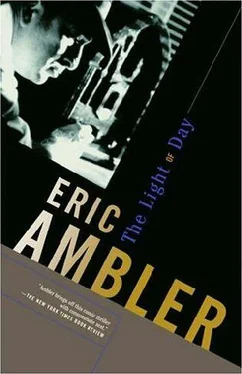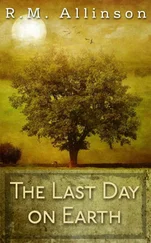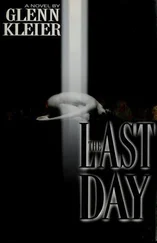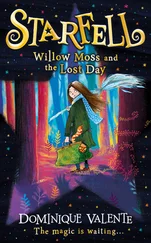Eric Ambler - The light of day
Здесь есть возможность читать онлайн «Eric Ambler - The light of day» весь текст электронной книги совершенно бесплатно (целиком полную версию без сокращений). В некоторых случаях можно слушать аудио, скачать через торрент в формате fb2 и присутствует краткое содержание. Жанр: Криминальный детектив, на английском языке. Описание произведения, (предисловие) а так же отзывы посетителей доступны на портале библиотеки ЛибКат.
- Название:The light of day
- Автор:
- Жанр:
- Год:неизвестен
- ISBN:нет данных
- Рейтинг книги:3 / 5. Голосов: 1
-
Избранное:Добавить в избранное
- Отзывы:
-
Ваша оценка:
- 60
- 1
- 2
- 3
- 4
- 5
The light of day: краткое содержание, описание и аннотация
Предлагаем к чтению аннотацию, описание, краткое содержание или предисловие (зависит от того, что написал сам автор книги «The light of day»). Если вы не нашли необходимую информацию о книге — напишите в комментариях, мы постараемся отыскать её.
The light of day — читать онлайн бесплатно полную книгу (весь текст) целиком
Ниже представлен текст книги, разбитый по страницам. Система сохранения места последней прочитанной страницы, позволяет с удобством читать онлайн бесплатно книгу «The light of day», без необходимости каждый раз заново искать на чём Вы остановились. Поставьте закладку, и сможете в любой момент перейти на страницу, на которой закончили чтение.
Интервал:
Закладка:
I got on fairly well with the other chaps. Because I had been born in Egypt, of course, they called me “Wog,” but, as I was fair-haired like my father, I did not mind that. My voice broke quite early, when I was twelve. After a while, I started going up to Hilly Fields at night with a fifth-former named Jones iv, who was fifteen, and we used to pick up girls-“square-pushing,” as they say in the army. I soon found that some of the girls didn’t mind a bit if you put your hand up their skirts, and even did a bit more. Sometimes we would stay out late. That meant that I used to have to get up early and do my homework, or make my aunt write an excuse note for me to take to school saying that I had been sent to bed after tea with a feverish headache. If the worse came to the worst, I could always crib from a boy named Reese and do the written work in the lavatory. He had very bad acne and never minded if you cribbed from him; in fact I think he liked it. But you had to be careful. He was one of the bookworms and usually got everything right. If you cribbed from him word for word you risked getting full marks. With me, that would make the master suspicious. I got ten out of ten for a chemistry paper once, and the master caned me for cheating. I had never really liked the man and I got my revenge later by pouring a test tube of sulphuric acid (conc.) over the saddle of his bicycle; but I have always remembered the lesson that incident taught me. Never try to pretend that you’re better than you are. I think I can fairly say that I never have.
Of course, an English public-school education is mainly designed to build character, to give a boy a sense of fair play and sound values, teach him to take the rough with the smooth, and make him look and sound like a gentleman.
Coram’s at least did those things for me; and, looking back, I suppose that I should be grateful. I can’t say that I enjoyed the process though. Fighting, for instance: that was supposed to be very manly, and if you did not enjoy it they called you “cowardy custard.” I don’t think it is cowardly not to want someone to hit you with his fist and make your nose bleed. The trouble was that when I used to hit back I always sprained my thumb or grazed my knuckles. In the end, I found the best way to hit back was with a satchel, especially if you had a pen or the sharp edge of a ruler sticking out through the flap; but I have always disliked violence of any kind.
Almost as much as I dislike injustice. My last term at Coram’s, which I should have been able to enjoy because it was the last, was completely spoiled.
Jones iv was responsible for that. He had left school by then, and was working for his father, who owned a garage, but I still went up to Hilly Fields with him sometimes. One evening he showed me a long poem typed out on four foolscap pages. A customer at the garage had given it to him. It was called The Enchantment and was supposed to have been written by Lord Byron. It began: Upon one dark and sultry day,
As on my garret bed I lay,
My thoughts, for I was dreaming half,
Were broken by a silvery laugh,
Which fell upon my startled ear,
Full loud and clear and very near.
Well, it turned out that the laugh was coming through a hole in the wall behind his bed, so he looked through the hole. A youth and maid were in the room,
And each in youth’s most beauteous bloom.
It then went on to describe what the youth and maid did together for the next half hour-very poetically, of course, but in detail. It was really hot stuff.
I made copies and let some of the chaps at school read it. Then I charged them fourpence a time to be allowed to copy it out for themselves. I was making quite a lot of money, when some fourth-form boy left a copy in the pocket of his cricket blazer and his mother found it. Her husband sent it with a letter of complaint to The Bristle. He began questioning the boys one by one to find out who had started it, and, of course, he eventually got back to me. I said I had been given it by a boy who had left the term before-The Bristle couldn’t touch him- but I don’t think he believed me. He sat tapping his desk with his pencil and saying “filthy smut” over and over again. He looked very red in the face, almost as if he were embarrassed. I remember wondering if he could be a bit “queer.” Finally, he said that as it was my last term he would not expel me, but that I was not to associate with any of the younger boys for the rest of my time there. He did not cane me or write to the Benevolent Association, which was a relief. But it was a bad experience all the same and I was quite upset. In fact, I think that was the reason I failed my matriculation.
At Coram’s they made a fetish out of passing your matric. Apparently, you couldn’t get a respectable job in a bank or an insurance company without it. I did not want a job in a bank or an insurance company-Mr. Hafiz had died and Mum wanted me to go back and learn the restaurant business-but it was a disappointment all the same. I think that if The Bristle had been more broad-minded and understanding, not made me feel as if I had committed some sort of crime, things would have been different. I was a sensitive boy and I felt that Coram’s had somehow let me down. That was the reason I never applied to join the Old Coramians Club.
Now, of course, I can look back on the whole thing and smile about it. The point I am making is that persons in authority-headmasters, police officials-can do a great deal of damage simply by failing to understand the other fellow’s point of view.
How could I have possibly known what kind of man this Harper was?
As I explained, I had simply driven out to the Athens airport looking for business. I spotted this man going through customs and saw that he was carrying his ticket in an American Express folder. I gave one of the porters two drachmas to get me the man’s name from his customs declaration. Then I had one of the uniformed airline girls give him my card and the message: “Car waiting outside for Mr. Harper.”
It is a trick I have used lots of times and it has almost always worked. Not many Americans or British speak demotic Greek; and by the time they have been through the airport customs, especially in the hot weather, and been jostled by the porters and elbowed right and left, they are only too ready to go with someone who can understand what they’re talking about and take care of the tipping. That day it was really very hot and humid.
As he came through the exit from the customs I went up to him.
“This way, Mr. Harper.”
He stopped and looked me over. I gave him a helpful smile, which he did not return.
“Wait a minute,” he said curtly. “I didn’t order any car.”
I looked puzzled. “The American Express sent me, sir. They said you wanted an English-speaking driver.”
He stared at me again, then shrugged. “Well, okay. I’m going to the Hotel Grande-Bretagne.”
“Certainly, sir. Is this all your luggage?”
Soon after we turned off the coast road by Glyphada he began to ask questions. Was I British? I side-stepped that one as usual. Was the car my own? They always want to know that. It is my own car, as it happens, and I have two speeches about it. The car itself is a 1954 Plymouth. With an American I brag about how many thousands of miles it has done without any trouble. For the Britishers I have a stiff-upper-lip line about part-exchanging it, as soon as I can save enough extra cash, for an Austin Princess, or an old Rolls-Royce, or some other real quality car. Why shouldn’t people be told what they want to hear?
This Harper man seemed much like the rest. He listened and grunted occasionally as I told him the tale. When you know that you are beginning to bore them, you usually know that everything is going to be all right. Then, you stop. He did not ask how I happened to live and work in Greece, as they usually do. I thought that would probably come later; that is, if there were going to be a later with him. I had to find out.
Читать дальшеИнтервал:
Закладка:
Похожие книги на «The light of day»
Представляем Вашему вниманию похожие книги на «The light of day» списком для выбора. Мы отобрали схожую по названию и смыслу литературу в надежде предоставить читателям больше вариантов отыскать новые, интересные, ещё непрочитанные произведения.
Обсуждение, отзывы о книге «The light of day» и просто собственные мнения читателей. Оставьте ваши комментарии, напишите, что Вы думаете о произведении, его смысле или главных героях. Укажите что конкретно понравилось, а что нет, и почему Вы так считаете.












